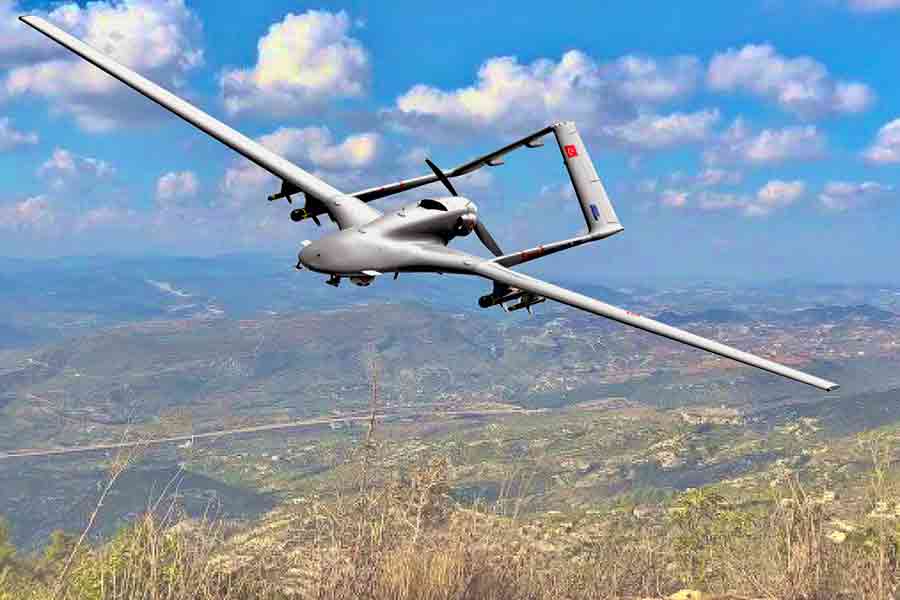The Polish national flag carrier LOT Polish Airlines (PLL, Polskie Linie Lotnicze LOT) filed a lawsuit against The Boing Company in a federal court in Seattle on October 26. The lawsuit demands a compensation of no less than PLN 1 billion ($252 million). Design faults in the Maneuvering Characteristics Augmentation System (MCAS), a flight-stabilizing software program installed on Boeing 737 MAX caused two crashes – one in Indonesia and the other in Ethiopia – in which 346 people died. This led to a two-year-long worldwide grounding of the new planes.
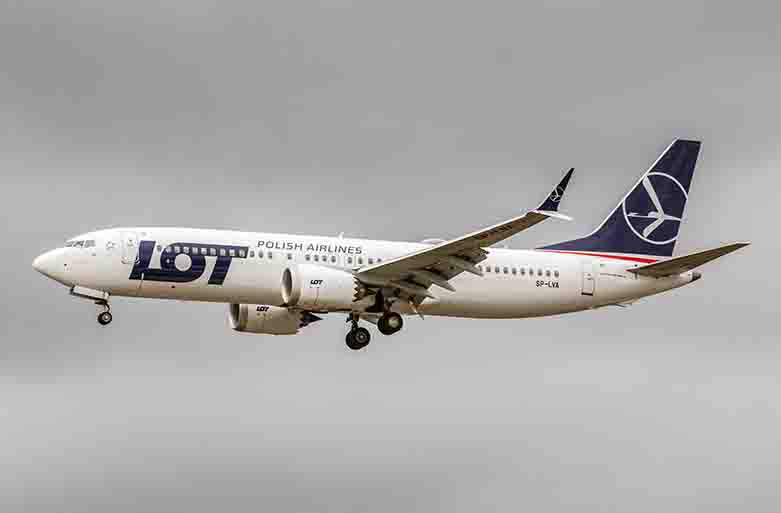
Boeing 737 MAX in LOT livery lands at London-Heathrow (Source: Wikipedia)
Negotiations Fail
The filing of this lawsuit was preceded by months of negotiations that have apparently failed to lead to a mutually agreeable settlement. The airline has had ongoing issues with Boeing not only regarding its 737 MAX aircraft, but also earlier problems with the long-distance 787 Dreamliners. In 2019, for example, three LOT Polish Dreamliners were grounded after their troubled Rolls-Royce Trent 1000 engines were removed for repairs. There were also problems with batteries, cables, and other manufacturing defects with the aircraft.
Already, in an interview in January 2020, LOT CEO Rafał Milczarski, while diplomatically expressing his full confidence in Boeing and its ability to safely return the B737 MAX to flying, mentioned the talks with the plane manufacturer about compensation for the grounded machines. He indicated that, if there were no problems with the MAX, the airline would have possibly crossed the threshold of 12 million passengers in 2019. In reality, LOT carried just over 10 million passengers in 2019, partly due to the MAX crisis. [2] Of course the pandemic of 2020 didn’t help the beleaguered carrier.
The airline was forced to fill the gaps in its schedule with different leased machines from other operators, at a premium, because of the short notice and the timing, as everyone, every airline operating the 737 MAX, was looking for replacements at roughly the same time. The airline argues that the grounding of the delivered aircraft and the deferral of planned deliveries during the period of LOT's rapid growth pre-COVID led to substantial losses as it forced the airline to lease multiple other aircraft through costly short-term deals. [9] This added significant expenses to the airline’s operational costs.
While some airlines have received compensation from Boeing because of the MAX’s grounding, LOT Polish Airlines did not. The US planemaker relied on a clause in its leasing contract with LOT that rules out compensation due to technical problems.
We are conducting and have conducted talks with Boeing about the issue. So far, these talks have not resulted in an outcome we expected, so we will be using all available solutions to obtain compensation.
Rafał Milczarski
CEO LOT Polish Airlines
B737 MAX
The Boeing 737 MAX was to be the sales hit of the American manufacturer and the most modern narrow-body aircraft in the world. At the time, it was the latest generation of the B737 line of aircraft produced since 1967. Overall, more than 10,000 copies of the type were manufactured and used by airlines around the world. It was by far the most popular airliner around the globe. The MAX was supposed to be the most economical – with fuel consumption 13% less than its predecessors – the most modern, and overall the best version of the B737.
The 737 MAX delivers the highest efficiency, reliability and passenger comfort in the single-aisle market by incorporating the latest technology CFM International LEAP-1B engines, Advanced Technology winglets, the Boeing Sky Interior, large flight deck displays, and other improvements. The efficiency gains helped make the MAX the fastest selling airplane in Boeing history with more than 4,000 orders to date from 92 customers worldwide. [10]
The reduced fuel consumption was primarily due to the new CFM International LEAP-1B engines, which, due to their larger dimensions, were placed more forward under the wing. Other design changes were also introduced, such as the characteristic double winglets on the wingtips, chevrons on the nacelles of the engines that debuted with the B787 Dreamliner, the extended front landing gear, and the modernized avionics.

Side view of the B737 Max in LOT livery (Source: LOT Polish Airlines)
LOT ordered a total of 15 Boeing 737 MAX planes. In addition to the five aircraft already in service at the time the grounding took effect in 2019, LOT had ten more aircraft of this type on order, which were delivered with a significant delay. The combined catalogue value of the order was $1.8 billion.
"LOT has been a valued customer for decades and we are delighted that it has become one of the first operators of the MAX in Europe," said Monty Oliver, vice-president Europe Sales, Boeing Commercial Airplanes in 2017. "The 737 MAX will provide LOT unmatched efficiency, range, reliability and operating costs all while continuing to provide a premium on-board experience for its passengers."
The first aircraft arrived in Poland, to much publicity, on December 2, 2017. "We are proud to be one of the first carriers in the world with the state-of-the-art Boeing 737 MAX aircraft in our short- and middle-haul fleet," said Rafal Milczarski, LOT’s CEO. [10]
LOT now says it could not use the aircraft from March 2019 to March 2021 due to regulators' decision to ground them.[2]
MCAS
Since many of B737 MAX modifications changed, for example, the center of gravity and center of thrust of the aircraft, the manufacturer installed the MCAS (Maneuvering Characteristics Augmentation System), a computer software-based system to support the work of pilots by automatically facilitating maneuvering and forcefully lowering the nose of the aircraft to reduce the risk of stalling, especially at takeoff power.
However, as it turned out, the system worked with excessive authority, turned on automatically, and did not respond to the pilot's attempts to pull the steering column in order to counteract its operation.
To disable the operation of the system manually was quite time consuming, unintuitive, and did not prevent inadvertent re-engagement. Information on the operation of the system was not included in the flight manual, or even highlighted in the aircraft certification process.
The Crashes
On October 29, 2018, the Boeing 737 MAX 8 of the Indonesian Lion Air airlines, Flight 610, fell into the Java Sea 13 minutes after taking off from Jakarta airport. 189 people were killed as a result.
Less than five months later, on March 10, 2019, Ethiopian Airlines' Boeing 737 MAX 8 crashed 7 minutes after take-off from Addis Ababa on its way to Nairobi as Flight 302. 157 people were killed.
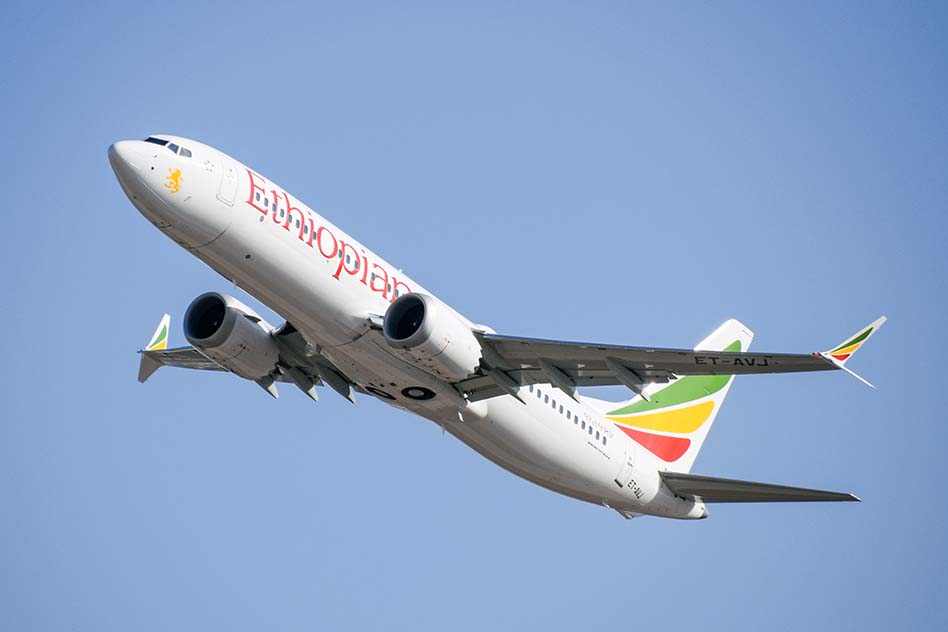
Ethiopian Airlines B737 MAX aircraft, registration ET-AVJ, that crashed as Flight 302
(Source: Wikipedia)
After those disasters, B737 MAX 8 flights were eventually suspended all over the world, including the five planes belonging to PLL LOT. The first to raise alarm was the Chinese regulatory agency, accused at the time of trying to stifle the US aircraft manufacturer in an anticompetitive move. Interestingly, but probably not surprising anyone, the FAA (Federal Aviation Administration), the US agency responsible for aircraft certification and the one most others in the world were following up to this point, was one of the last ones to ground the aircraft.
MCAS as the Cause of the Crashes
Less than a month after the second B737 MAX catastrophe, the Ethiopian investigators found that its direct cause was a malfunction of the MCAS. The finding was initially met with a bit of a disbelief on the part of the manufacturer and the FAA.
The Ethiopian report said the plane was in "a repetitive, uncontrolled nose down position caused by MCAS software" and that the pilots were unable to regain control of the machine despite following the procedures in place. Similarly, the Indonesian investigators, whose final report came out a few days before the first anniversary of the crash, found that it was caused by a flawed MCAS design.
When the two disasters were thoroughly investigated, shortcomings in the management as well as in the certification of the new aircraft became apparent in the process, causing a loss of trust in the manufacturer and the FAA certification procedure.
Loss of Trust
This trust has been severely damaged after disclosing that the concern knew about the safety problems of the B737 MAX aircraft as early as 2016 , already at the stage of certification of the new aircraft. Boeing itself was actively involved in the airworthiness certification process of its aircraft, raising questions about a potential conflict of interest.
After two disasters, less than five months apart, many questions were raised about the safety and reliability of the process of allowing Boeing machines to fly. Since then, the American manufacturer is struggling with a huge crisis, for which its president, Dennis Muilenburg, has already paid with his position.
Why Is Boeing Failing?
The problem with Boeing airplanes supposedly arose when the company took over the failing aircraft manufacturer McDonnell Douglas in 1997 and a large number of its employees from the company's military division joined Boeing at the time. Together with their knowledge, they introduced a completely different, military philosophy of work into Boeing, where wildly experimenting, testing new techniques, is more important than safety. [7]
Another theory is that Boeing was taken over by "bean counters", that is individuals more concerned about sales and profitability than about sound design and safety standards. The cutthroat competition with Airbus, the relentless pursuit of profits above all else, skimping on testing and training, shortening the design cycles, and outsourcing much of its manufacturing, are all said to have contributed to the decline of the once proud airframer.
Choice of Venue
It’s interesting to speculate why LOT chose Seattle as the venue for its lawsuit. After all, the Boeing Company is a multinational corporation headquartered in Chicago, Illinois. The corporate headquarters was moved from Seattle, Washington to Chicago in 2001, after 85 years, but Washington is still likely reeling from this move. Why, then, did LOT choose to sue in Seattle rather then in Chicago?
If we were to guess, this may have something to do with the fact that, in the eyes of some, Boeing has abandoned the State of Washington for greener (and cheeper) pastures in the Midwest, putting its original home state in a position of disappointment, whereas it settled in the state of Illinois, where it has instantly become one of its major employers. Could it be that the Polish Airlines expect a more favorable legal treatment in the disillusioned Washington rather than in the still hopeful Illinois? Who knows!? In all fairness, Seattle – and its vicinity – is still home to numerous Boeing facilities.
Lawsuit or a Settlement?
LOT was not the only dissatisfied customer.
Earlier this year, Boeing paid over $2.5 billion to settle a charge of criminal conspiracy to defraud the Federal Aviation Administration. The company admitted to criminal misconduct for misleading regulators about the safety of the 737 MAX. [8]
Last month, a judge in Delaware allowed a case to proceed in which shareholders are seeking to sue Boeing’s directors for “ignoring a red flag” after the first 737 MAX crash and “publicly lying about if and how it monitored…safety”. [8]
Last minute update: A group of current and former Boeing directors has agreed to settle the shareholder lawsuit out of court. Under the proposed settlement, announced today, Boeing would make safety and oversight changes, and would pay $237.5 million to Boeing — benefiting the shareholders — through the directors’ insurers. [11] So, it is the insurance companies that will bear the cost of oversight by supervisory board members.
Boeing was facing a series of litigation actions from other airlines as well. Many of these airlines have already received compensation from the company, though, but LOT did not. Carriers received compensation in cash or in discounts for subsequent orders. According to some sources [7] LOT is perhaps the last airline that has not yet received compensation for the two-year grounding of the MAX.
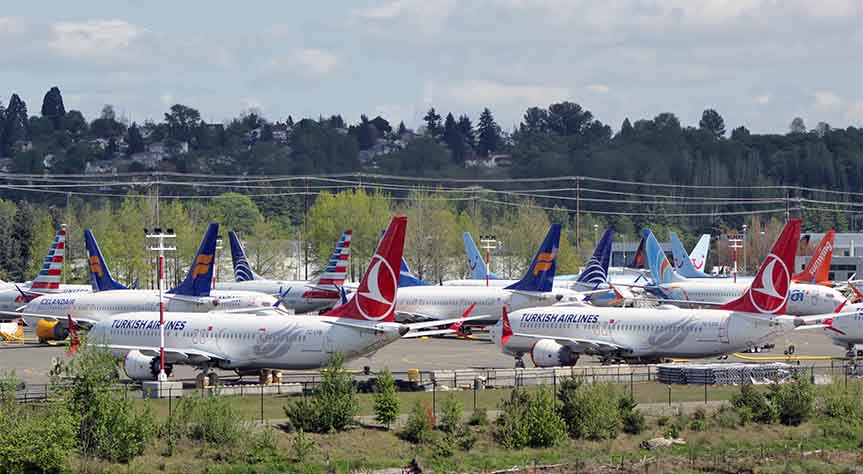
B737 MAX airplanes grounded at Boeing Field, Seattle, Washington in 2019 (Source: Wikipedia)
The two-year cost of downtime for one B737 MAX is estimated at $30 million. For five machines, LOT should have received the equivalent of $150 million. However, the leasing contract had no written guarantees of compensation due to any technical problems. This legal catch is now being invoked by Boeing. The fate of the lawsuit is therefore uncertain. If the adjudicating judge is not favorable to LOT, he or she may stick to the formal provisions of the contract and not award any damages.
In the event of a loss in the United States, the airline would have to appeal to international arbitration. Overall, the judicial process would be expected to take years, if not decades.
We predict that, at best, LOT will receive only a portion of the compensation it is asking for in the lawsuit. Of the $250 million sought, maybe not even the full estimated amount of its losses, $150 million, will be awarded.
The most likely scenario is that the matter will be settled out of court, after all, before the case gets going in earnest. Settling out of court is very much in Boeing’s interest, since the company must be eager to put the whole B737 Max debacle behind them. After all, a prolonged discovery process and detailed testimony would surely not work in Boeing’s favor.
Flawed Contract
On the other hand, it’s hard to avoid the impression that the deals LOT made with the Americans was simply a bad one. Not only were there no clauses guaranteeing compensation in case of technical or manufacturing problems, but LOT supposedly buys its planes at list prices, or supposedly above them, even though – as a regular, long-time customer – it it should be able to negotiate significant discounts.
The aircraft were placed by ALC Blarney Aircraft, rather than directly from Boeing. The lessor named in this deal was Export-Import Bank, the financial arm of Boeing, which is operating mainly for the benefit of the American manufacturer. Why has LOT negotiated so poorly?
As Polityka points out:
It is difficult to say why LOT is not doing so well in trade negotiations with an aircraft manufacturer. Is it the lack of professionalism of subsequent teams and boards, or the unreflective faith in the good intentions of Americans, resulting from the unjustified and, above all, unrequited love of Poles for the United States? [7]
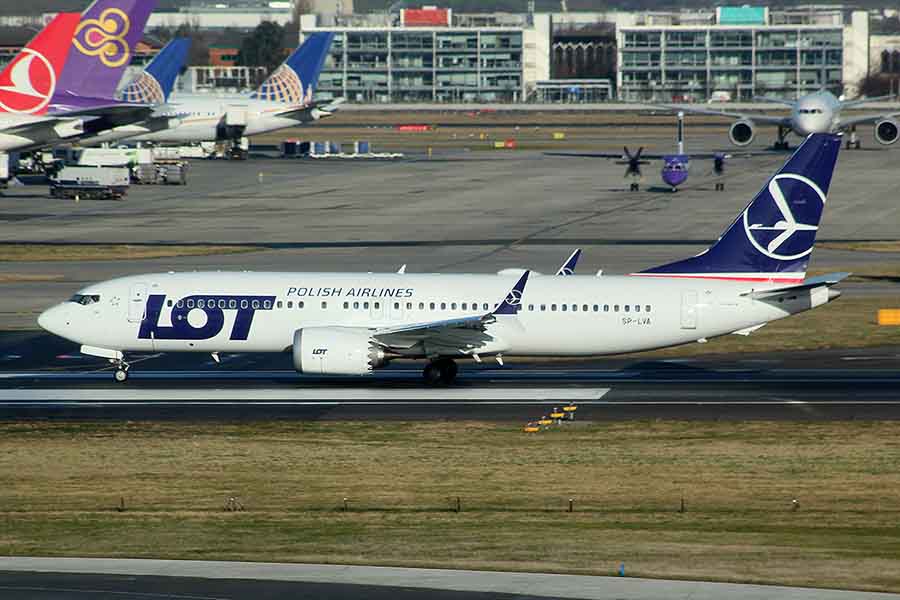
B737 MAX at Heathrow on December 28, 2017 (Source: Wikipedia)
The End of an Era...?
It’s not just the outcome of the lawsuit that’s at stake. The CEO Milczarski said he was open to defecting to European plane builder Airbus and becoming an all-Airbus airline.
To date, LOT Polish has been one of the few European airlines not flying Airbus aircraft. Almost all airlines from European Union countries use Airbus, primarily in the medium-range aircraft segment. Among the major national carriers, only the Dutch KLM and LOT are the exceptions.
LOT has been a loyal Boeing customer since the fall of communism in 1989, ever since a B767-200(ER), SP-LOA, its first Western-built aircraft, was delivered in April 1989. The airline has a fleet of Boeing 787 Dreamliners, Boeing 737 MAX 8s, Boeing 737-800s, and Embraer E195, E190, E175, and E170 aircraft. The airline has a goal to unify its fleet by the year 2030, so there is a possibility that it could become an Airbus-only operator by then.
"Airbus is definitely in the game," confirms LOT spokesman Krzysztof Moczulski, "Which of course does not eliminate the current suppliers, Boeing and Embraer.” [6] Nothing like the age-old negotiation tactics of leaving one’s options open until the last minute…
Leaving its options open may help LOT regain its negotiation position with respect to future orders. The fact that the negotiations with Boeing already failed and it came to litigation may, however, be an indicator that the rift between LOT and Boeing is opening wider. Or it may be purely a tactical maneouver designed to get Boeing to settle out of court. Time will tell.
However, while the litigation is ongoing, it is highly unlikely for LOT, as the plaintiff, to place new orders with the defendant. Recently, the state-owned airline said it would not take another two B787-9s it had ordered through lessors and put in storage in the United States during the COVID-19 pandemic. The airline has also been in talks about the cancellation or renegotiation of the terms of its outstanding B737-8 MAX commitments. LOT believes the delay caused by the grounding allows it to rescind the deals with no penalties.




